January 2023
An Annoying Kernel of Truth: Corns Happen
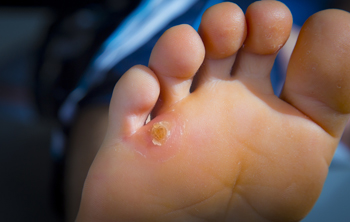
Foot corns are common. They resemble calluses but they are smaller, harder, and often more painful. The discomfort and irritation caused by corns is a result of the body’s response to friction or pressure from repetitive actions or ill-fitting shoes that cause friction. There are three types of corns. A hard corn is the most common type of corn and is a small, concentrated area of hard skin, usually found within a wider area of thickened skin. A soft corn is white or gray in color and has a rubbery texture. Hard and soft corns usually show up between toes. A seed corn is often found on the bottom of the foot and is smaller. Corns can be safely treated, and it is possible to prevent future corns. First, stop movements that cause repetitive pressure on your feet and wear well-fitting shoes that do not rub against the feet and cause pain. If the corn does not go away, see a podiatrist who can provide additional and successful treatment of corns.
Corns can make walking very painful and should be treated immediately. If you have questions regarding your feet and ankles, contact the podiatrists of New England Family Foot Care. Our doctors will treat your foot and ankle needs.
Corns: What Are They? And How Do You Get Rid of Them?
Corns are thickened areas on the skin that can become painful. They are caused by excessive pressure and friction on the skin. Corns press into the deeper layers of the skin and are usually round in shape.
Ways to Prevent Corns
There are many ways to get rid of painful corns such as:
- Wearing properly fitting shoes that have been measured by a professional
- Wearing shoes that are not sharply pointed or have high heels
- Wearing only shoes that offer support
Treating Corns
Although most corns slowly disappear when the friction or pressure stops, this isn’t always the case. Consult with your podiatrist to determine the best treatment option for your case of corns.
If you have any questions please feel free to contact our office located in Milton, MA . We offer the newest diagnostic and treatment technologies for all your foot and ankle needs.
Constricting Shoes May Cause Morton’s Neuroma
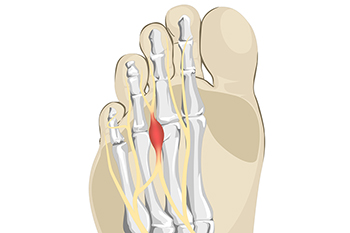
Morton’s neuroma is one of the most painful foot conditions that can develop. The pain is felt between the third and fourth toes and results due to an inflamed nerve. If the arch is weak the nerve can become compressed, causing the tissues to thicken. This can happen from wearing shoes that do not have enough room for the toes to move freely in, therefore the nerve becomes irritated. A numbness or tingling sensation can often be felt with this condition and walking may become difficult. Morton’s neuroma may also gradually develop from extreme overpronation which is the foot continuously rolling inward while walking. This may cause the bones in the front of the foot to compress the nerve. Effective treatment generally begins with frequently resting the foot and some patients choose to insert a cushioned pad into the shoe. If you have developed Morton’s neuroma, please confer with a podiatrist who can effectively treat this condition while offering you pain relief options.
Morton’s neuroma is a very uncomfortable condition to live with. If you think you have Morton’s neuroma, contact the podiatrists of New England Family Foot Care. Our doctors will attend to all of your foot care needs and answer any of your related questions.
Morton’s Neuroma
Morton's neuroma is a painful foot condition that commonly affects the areas between the second and third or third and fourth toe, although other areas of the foot are also susceptible. Morton’s neuroma is caused by an inflamed nerve in the foot that is being squeezed and aggravated by surrounding bones.
What Increases the Chances of Having Morton’s Neuroma?
- Ill-fitting high heels or shoes that add pressure to the toe or foot
- Jogging, running or any sport that involves constant impact to the foot
- Flat feet, bunions, and any other foot deformities
Morton’s neuroma is a very treatable condition. Orthotics and shoe inserts can often be used to alleviate the pain on the forefront of the feet. In more severe cases, corticosteroids can also be prescribed. In order to figure out the best treatment for your neuroma, it’s recommended to seek the care of a podiatrist who can diagnose your condition and provide different treatment options.
If you have any questions, please feel free to contact our office located in Milton, MA . We offer the newest diagnostic and treatment technologies for all your foot care needs.
How Can Common Sports Injuries Be Prevented?
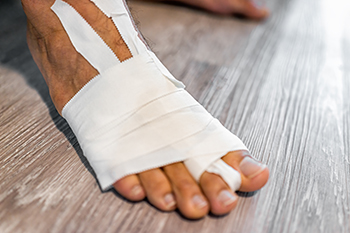
Anyone who participates in sports or running activities knows that sooner or later they are liable to sustain some type of foot, toe, or ankle injury. Precautions that can help you to avoid such injuries are warming up before exercising and resisting the urge to do more than your body is prepared for. Additionally, it can help to increase exercise levels slowly. Most sports injuries are caused by doing too much too soon, overestimating your stamina and strength, and poor technique. Other causes include overtraining by pushing your body too hard, accidents, and using poor equipment. This last cause includes wearing shoes that do not fit properly, are wrong for the activity, or fail to provide proper support and cushioning needed for that sport. It is also important to pay attention to any pain you may incur during sports activities. Ignoring it can make a mild injury or condition much worse. Furthermore, continuing play or exercise despite the pain can increase the time it takes to recover. Seeking medical advice from a podiatrist when you experience foot, toe or ankle pain is a wise course of action. A podiatrist can make a thorough examination, determine the cause of the pain, and provide appropriate treatment options.
Ankle and foot injuries are common among athletes and in many sports. They can be caused by several problems and may be potentially serious. If you are feeling pain or think you were injured in a sporting event or when exercising, consult with the podiatrists from New England Family Foot Care. Our doctors will assess your condition and provide you with quality foot and ankle treatment.
Common Injuries
The most common injuries that occur in sporting activities include:
- Achilles Tendonitis
- Achilles Tendon Rupture
- Ankle Sprains
- Broken Foot
- Plantar Fasciitis
- Stress Fractures
- Turf Toe
Symptoms
Symptoms vary depending upon the injury and in some cases, there may be no symptoms at all. However, in most cases, some form of symptom is experienced. Pain, aching, burning, bruising, tenderness, tightness or stiffness, sensation loss, difficulty moving, and swelling are the most common symptoms.
Treatment
Just as symptoms vary depending upon the injury, so do treatment options. A common treatment method is known as the RICE method. This method involves rest, applying ice, compression and elevating the afflicted foot or ankle. If the injury appears to be more serious, surgery might be required, such as arthroscopic or reconstructive surgery. Lastly, rehabilitation or therapy might be needed to gain full functionality in the afflicted area. Any discomfort experienced by an athlete must be evaluated by a licensed, reputable medical professional.
If you have any questions, please feel free to contact our office located in Milton, MA . We offer the newest diagnostic and treatment technologies for all your foot care needs.
Orthotics and Children
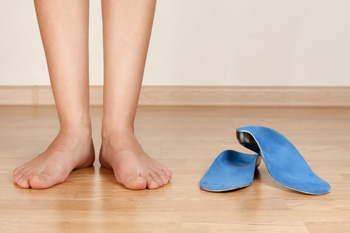
Orthotics are shoe inserts that serve a variety of purposes and can be either custom-made or over-the-counter. Some orthotics are simply meant to provide support and others are meant to correct certain foot deformities. While orthotics are used by adults sometimes children might also benefit from wearing orthotics. Many children are afflicted by a condition known as Sever’s disease, which causes heel pain. Heel pain is a common painful sensation among children. The use of certain orthotic devices can help combat the damaging effects of heel pain among children and young adults. Besides heel pain, there are also many other different common symptoms that children experience in the feet that can be addressed through the use of orthotics. For example, misaligned feet and knee pain are other common symptoms in children, and orthotics might be a good option. If you have a child that is experiencing any of these problems, contact a podiatrist today.
If you are having discomfort in your feet and would like to try orthotics, contact the podiatrists from New England Family Foot Care. Our doctors can provide the care you need to keep you pain-free and on your feet.
What Are Orthotics?
Orthotics are inserts you can place into your shoes to help with a variety of foot problems such as flat feet or foot pain. Orthotics provide relief and comfort for minor foot and heel pain but can’t correct serious biomechanical problems in your feet.
Over-the-Counter Inserts
Orthotics come in a wide variety of over-the-counter inserts that are used to treat foot pain, heel pain, and minor problems. For example, arch supports can be inserted into your shoes to help correct overarched or flat feet, while gel insoles are often used because they provide comfort and relief from foot and heel pain by alleviating pressure.
Prescription Orthotics
If over-the-counter inserts don’t work for you or if you have a more severe foot concern, it is possible to have your podiatrist prescribe custom orthotics. These high-quality inserts are designed to treat problems such as abnormal motion, plantar fasciitis, and severe forms of heel pain. They can even be used to help patients suffering from diabetes by treating foot ulcers and painful calluses and are usually molded to your feet individually, which allows them to provide full support and comfort.
If you are experiencing minor to severe foot or heel pain, it’s recommended to speak with your podiatrist about the possibilities of using orthotics. A podiatrist can determine which type of orthotic is right for you and allow you to take the first steps towards being pain-free.
If you have any questions please contact our office located in Milton, MA . We offer the newest diagnostic and treatment technologies for all your foot and ankle needs.
Heel Pain Can Be Treated!
Pain in Various Areas of the Foot
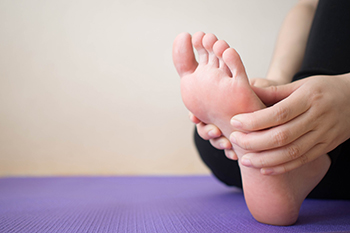
Many people experience foot pain, and there are several areas of the foot where this can occur. These can include the heel, arch, toes, or soles of the feet, and there are various reasons for pain to develop in different parts of the foot. Pain in the big toe may indicate the painful condition that is known as gout, or it may be arthritis, both of which affect the joints. A bunion is a bump that develops on the side of the big toe and may cause pain as shoes are worn. A corn on the pinky toe is one of the most painful foot conditions there is, despite its small size. It often develops as a result of wearing shoes that do not fit correctly. There are several causes for foot pain to occur, and these can consist of standing on hard surfaces for most of the day, being overweight, or having endured a foot injury. If you have foot pain for any reason, please consult with a podiatrist, sooner rather than later, who can accurately determine the reason why and offer effective treatment solutions.
Foot Pain
Foot pain can be extremely painful and debilitating. If you have a foot pain, consult with the podiatrists from New England Family Foot Care. Our doctors will assess your condition and provide you with quality foot and ankle treatment.
Causes
Foot pain is a very broad condition that could be caused by one or more ailments. The most common include:
- Bunions
- Hammertoes
- Plantar Fasciitis
- Bone Spurs
- Corns
- Tarsal Tunnel Syndrome
- Ingrown Toenails
- Arthritis (such as Gout, Rheumatoid, and Osteoarthritis)
- Flat Feet
- Injury (from stress fractures, broken toe, foot, ankle, Achilles tendon ruptures, and sprains)
- And more
Diagnosis
To figure out the cause of foot pain, podiatrists utilize several different methods. This can range from simple visual inspections and sensation tests to X-rays and MRI scans. Prior medical history, family medical history, and any recent physical traumatic events will all be taken into consideration for a proper diagnosis.
Treatment
Treatment depends upon the cause of the foot pain. Whether it is resting, staying off the foot, or having surgery; podiatrists have a number of treatment options available for foot pain.
If you have any questions, please feel free to contact our office located in Milton, MA . We offer the newest diagnostic and treatment technologies for all your foot care needs.





